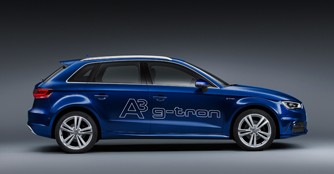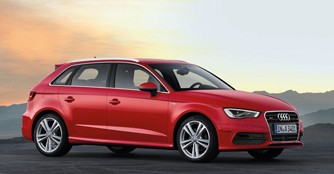Audi A3 Sportback running on CO2 neutral fuel
15 Mar 2013|3,317 views
A large step towards sustainable mobility for Audi - with the introduction of the A3 Sportback g-tron at the Geneva Motor Show. The compact five-door car, due to make its debut at the end of the year, is powered by the CO2-neutral fuel, Audi e-gas.

First and foremost, the Audi Sportback g-tron showcases state-of-the-art CNG drive technology, starting with the fuel storage. Its two tanks under the luggage compartment floor can each hold 7kg of CNG at a maximum 200 bar pressure. In tune with the ultra-lightweight construction concept, each tank weighs 27kg less than its conventional counterpart.
The engine of the A3 Sportback g-tron is based on the new 1.4 TFSI. Key modifications relate to the cylinder head, turbocharging, injection system, and the catalytic converter. Developing 110bhp and 200Nm of torque, the Audi A3 Sportback g-tron has a top speed of 190km/h, going from 0 to 100km/h in 11 seconds.

When the A3 Sportback g-tron is powered by Audi e-gas, no more CO2 is released than was chemically input in its production beforehand - creating a closed loop. When the energy required to build the e-gas facility and wind power generators is included in a comprehensive analysis, CO2 emissions are still less than 30g/km.
With the e-gas project, Audi is the first automobile manufacturer to develop an entire chain of sustainable energy carriers. The start of the chain has electricity produced from renewable energy sources with end products such as hydrogen and the synthetic Audi e-gas.
A large step towards sustainable mobility for Audi - with the introduction of the A3 Sportback g-tron at the Geneva Motor Show. The compact five-door car, due to make its debut at the end of the year, is powered by the CO2-neutral fuel, Audi e-gas.
The Audi A3 range has been a huge success story for Audi, and very well accepted by consumers worldwide. One of the latest model currently available, the Audi A3 Sportback 1.4 TFSI with cylinder-on-demand is already producing CO2 emissions that are as little as 110g/km. This is made possible with the help of Audi's ultra lightweight technology, which has enabled it to be 90kg lighter than its predecessor.
First and foremost, the Audi Sportback g-tron showcases state-of-the-art CNG drive technology, starting with the fuel storage. Its two tanks under the luggage compartment floor can each hold 7kg of CNG at a maximum 200 bar pressure. In tune with the ultra-lightweight construction concept, each tank weighs 27kg less than its conventional counterpart.
The engine of the A3 Sportback g-tron is based on the new 1.4 TFSI. Key modifications relate to the cylinder head, turbocharging, injection system, and the catalytic converter. Developing 110bhp and 200Nm of torque, the Audi A3 Sportback g-tron has a top speed of 190km/h, going from 0 to 100km/h in 11 seconds.
The five-door car consumes an average of less than 3.5kg/100km of CNG or Audi e-gas - the fuel that is generated from eco-electricity in the Audi e-gas project. CO2 emissions are less than 95g/km in gas mode.
When the A3 Sportback g-tron is powered by Audi e-gas, no more CO2 is released than was chemically input in its production beforehand - creating a closed loop. When the energy required to build the e-gas facility and wind power generators is included in a comprehensive analysis, CO2 emissions are still less than 30g/km.
With the e-gas project, Audi is the first automobile manufacturer to develop an entire chain of sustainable energy carriers. The start of the chain has electricity produced from renewable energy sources with end products such as hydrogen and the synthetic Audi e-gas.
Latest COE Prices
November 2025 | 1st BIDDING
NEXT TENDER: 19 Nov 2025
CAT A$110,002
CAT B$115,001
CAT C$76,000
CAT E$121,010
View Full Results Thank You For Your Subscription.






















